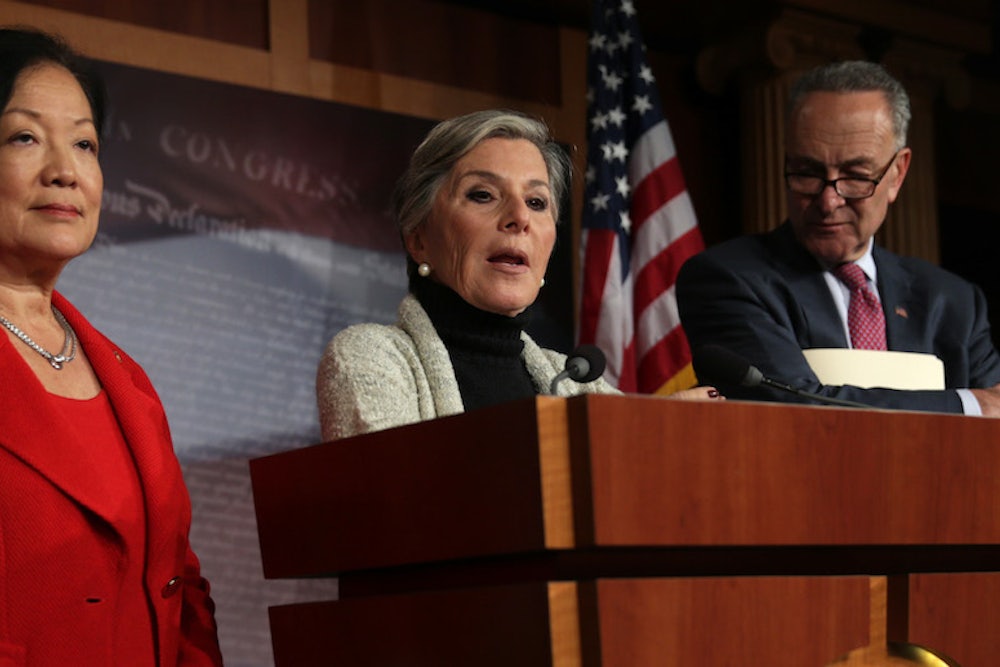John Boehner announced to House Republicans today that he would, indeed, bring a “clean” debt-ceiling bill to a vote, eliminating the prospect of another political stand-off over whether or not the country will default on its debts. For now. Congress and the executive deadlocked on raising the debt ceiling back in 2011. Then again in October of last year. And, for all the good feelings about this latest move away from the brink, they may well do so again. Which is why Congress and the White House ought to use this respite to adopt a change that will put an end to debt ceiling fights for good.
Recently, several members of Congress, including Representative Mike Honda and Senators Barbara Boxer, Chuck Schumer, and Mazie Hirono, introduced legislation to do just that. The bills provide that when the national debt comes within $100 billion of the ceiling, the president may send a notification to Congress to that effect. Congress then would have a limited period of time during which it may issue a joint resolution that forbids borrowing above the debt ceiling. If Congress fails to pass such a resolution, or does but it is vetoed, Treasury may borrow beyond the debt ceiling. The bills make sense, and Congress should act on them as soon as possible.
Under the bills, Congress retains its constitutionally mandated power of the purse. It can create or destroy any programs it wants; it can cut funding to existing programs. The only effect of the bill is to restrict the power of Congress to cause the United States to default on its debts.
No one wants the United States to default. If the United States defaulted, then its cost of borrowing would increase, causing taxpayers billions of dollars to service new debt. Worse, the financial system could collapse because of the essential role that U.S. treasuries play in supplying a safe source of liquidity. If the United States defaulted, or even verged on default, many financial transactions would become impossible, and some banks could become insolvent.
Nonetheless, last year, Republican members of Congress saw substantial short-term gains from using the threat of default to oppose Obama administration policies. Many still do. The thinking seems to be that if Congress threatens not to raise the debt ceiling, the Obama administration will be forced to make important concessions—for example, weakening the Affordable Care Act or reducing entitlements.
This thinking is understandable but dangerous. In any game of chicken, usually one side will blink. But if played over and over, eventually the two players will crash into each other. If a showdown over the national debt takes place every couple of years, eventually a default will take place. Republicans and Democrats should put aside their differences and ensure that this never happens. The bills in Congress would do just that.
Republicans might respond that the bills would amount to surrender. Why should they give up their source of leverage in return for nothing at all? But Republican members of Congress would retain their ability to negotiate over entitlement programs and all other laws. They could deny support of Democratic proposals unless the Democrats give them something in return. They can even shut down the government. All that they would be unable to do is destroy the financial system.
Some Republicans have suggested that if the debt ceiling were reached, Treasury could cut payments to other programs so that it can continue to pay interest on the debt. But it’s not clear that Treasury could legally do this, and even if it could, the disruption to the economy—as Social Security recipients, hospitals, soldiers, FBI agents, and others went without their checks—would be significant. And because Treasury would have to choose who gets paid and who does not get paid, Republicans would be handing over to the president enormous discretion that would enable him to refrain from paying for programs they care about. To say the least, doing so is in tension with their recent complaints that President Obama wields executive power too freely.
Other Republicans take the contrary view that these showdowns can’t really hurt the economy because the market doesn’t believe that Congress would ever force a debt default. If market players don’t believe that a default could occur, we needn’t worry that the threat of default will disrupt the market or that a default could even happen. But if that is the case, then House Republicans don’t gain any leverage from threatening to default—the threat has no credibility—and so they shouldn’t object to a law that formalizes this state of affairs.
In any event, the premise of this argument does not seem to be true. The 2011 debt-ceiling conflict led Standard and Poor’s to downgrade U.S. debt. Both the 2011 and the 2013 conflicts were accompanied by turmoil in the markets, and several studies suggest that they harmed the economy to the tune of billions of dollars. Market participants probably believe that the U.S. will pay its debts in the end, but that there could be technical, short-term defaults that throw off their models and create regulatory havoc. Even a small risk of such an outcome is enough to roil the markets.
Republicans seem to have suffered politically from the last two debt-ceiling crises, and that is why they don’t appear to have much fight left in them for this one. It appears that in these sorts of standoffs between the president and Congress, the political optics favor the president—perhaps because the public dislikes brinkmanship and believes that Congress should fund what it legislates. Whatever the case, Republicans have increasingly little to lose by giving up this source of leverage, and they might earn some gratitude from moderates if they support the legislation now pending in Congress.
Debt brinkmanship has no place in democratic politics. This simple and reasonable legislation would end it.
